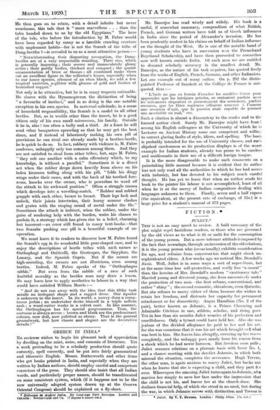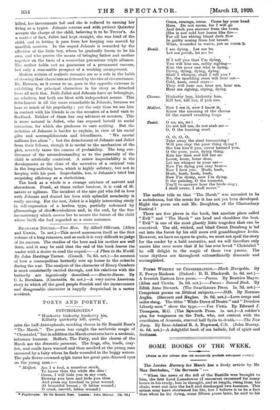FICTION.•
JULIET.*
Tins is not an easy novel to review. A bald summary of the plot might repel fastidious readers, or those who are governed by the old views as to what is fit or unfit for the consumption of the young person. But a more tolerant attitude is imposed by
the fact that nowadays, through an inversion of the old relations, it is the young person who (occasionally) exhibits consideration for age, and refrains from conversation that might shock un-
sophisticated elders. A few weeks ago we noticed Mrs. Dowdall's Susie. Well, Juliet is in some ways a sort of super-Susie, but at the same time less self-protective, and really less "a-moral" than the heroine of Mrs. Dowdall's modern " cautionary tale." Married young and divorced young, she lives successively under the protection of two men—the first urbane, conventional, and rather " shiny " ; the second romantic, chivalrous, even Quixotic. But she refuses to marry either of them because she wishes to retain her freedom, and distrusts her capacity for permanent attachment or for domesticity. Angus Hamilton (No. 2 of the pair), bettor known as Johnnie, is a Prince Charming and Admirable Crichton in one, athlete, scholar, and rising poet. Yet in less than six months Juliet wearies of his perfection and unselfishness. Only a tyrant could have held her. Also she was jealous of the divided allegiance he paid to her and his art, for she was conscious that it was his art which brought out what was best in him. She leaves him abruptly, covering up her traces completely, and the unhappy poet nearly loses his reason from a shock which he had never foreseen. But freedom soon palls ; Juliet resumes relations on a platonic basis with lover No. 1, and a chance meeting with the derelict Johnnie, in which both misread the situation, completes the severance. Hugh Trevor, the other man, is again anxious to marry Juliet, but backs out when he learns that she is expecting a child, and they part fcr ever. Whereupon the amazing Juliet turns again to Johnnie, wlo marries her simply to save her face under the impression that the child is not his, and leaves her at the church-door. She declines financial help, of which she stood in no need, but during the war, in which Johnnie serves with distinction and Trevor is • Juliet. By V. Y. Howson. London : PhWp Allan. (7a. net.)
killed, her investments fail and she is reduced to earning her living as a typist. Johnnie returns and with patient Quixotry accepts the charge of the child, believing it to be Trevor's. As a matter of fact, Juliet had kept straight, she was fond of the child, and in letting it pass from her keeping was moved by unselfish motives. In the sequel Johnnie is rewarded by the affection of the little boy, whom he gradually learns to be his own, and who proves the means of bringing father and mother together on the basis of a somewhat precarious triple alliance. The author holds out no guarantee of a permanent success, but only a reasonable prospect of a working arrangement.
Modern writers of realistic romance are as a rule in the habit of showing their characters as fettered by the ties of circumstance. Mr. Hewson, as it seems to us, goes to the opposite extreme in exhibiting the principal characters in his story as detached from all such ties. Both Juliet and Johnnie have no belongings, no relatives, but both are blest with independent means. This detachment is all the more remarkable in Johnnie, because we hear so much of his popularity ; yet the only time we see him in contact with his friends is on the occasion of a brief visit to Scotland. Neither of them has any advisers or mentors. This is more natural in Juliet, who has exposed herself to social ostracism, for which she professes to care nothing. But the isolation of Johnnie is harder to explain, in view of his social gifts and accomplishments and friendliness. " We mortal millions live alone " ; but the detachment of Johnnie and Juliet from their follows, though it is useful to the mechanism of the plot, severely taxes the canons of probability. The long con- tinuance of the •misunderstanding as to the paternity of the child is artificially contrived. A minor improbability is the development at the close of the narrative of a satirical vein in the long-suffering hero, which is highly salutary, but not in keeping with his past. Improbable, too, is Johnnie's brief but surprising efficiency as a statistician.
The book as a whole is a strange mixture of naivete and shrewdness. Frank, at times rather luscious, it is void of ill- nature or ugliness. The incident of the nice girl who fell in love with Johnnie and denied her love with splendid mendacity is really moving. For the rest, Juliet is a highly interesting study in self-expression of a lawless type, partially redeemed by glimmerings of disidterestedness and, in the end, by the fine inconsistency which moves her to secure the future of the child whose birth she had regarded as a mere nuisance.











































 Previous page
Previous page